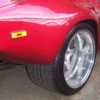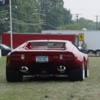It looks to me like I'm not getting full tire contact patch with the road. It seems that the outside edges of the rear tires are always black, when they should have dirt on them like the rest of the tire.
They look straight when viewed from behind, and down the side of the car. They look like they're at the same angle as my front tires too. The documentation I have with the car claims that the rear control arms were replaced with extended ones to minimize rear tire wear. This was done about 10 years ago.
Has a different or better fix come out since then that can help me correct this before my new rear tires start to wear unevenly?
Here's a picture of the tire tread with the dirt pattern.
Michael
Attachments
Original Post



